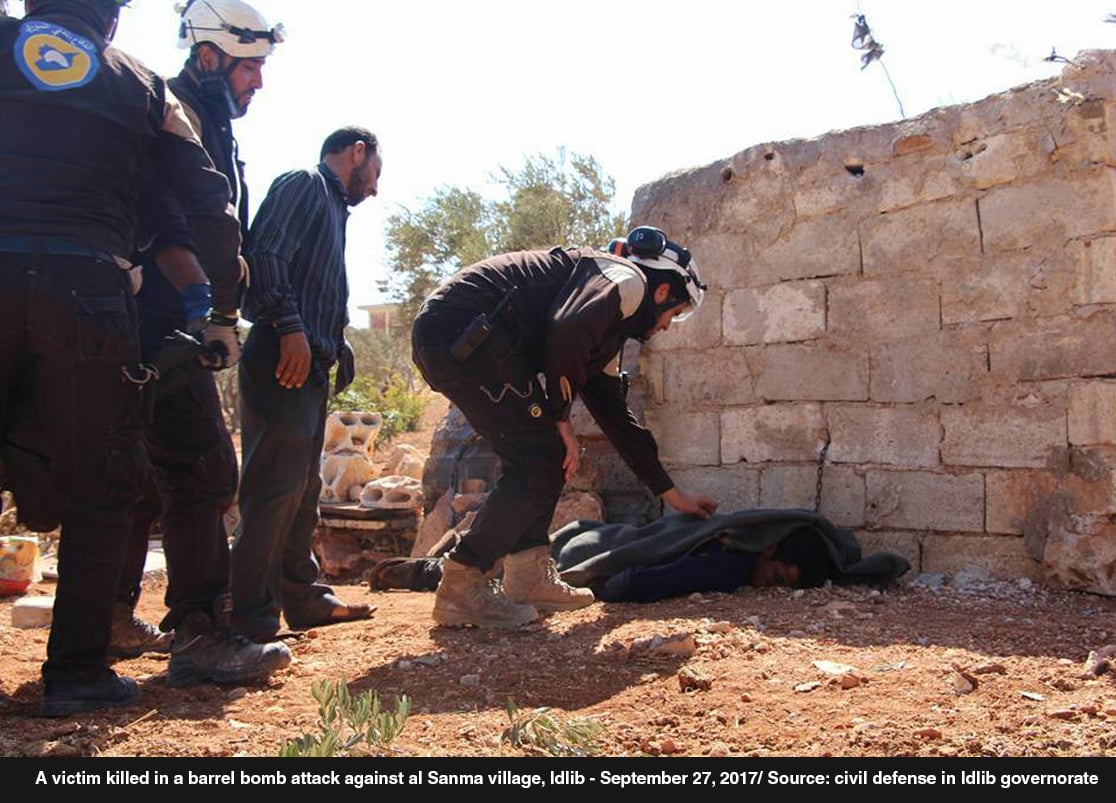
SNHR has published its monthly report on the use of barrel bombs by Syrian regime forces for the month of November.
The report notes that a comprehensive ceasefire was announced from the Turkish capital Ankara under a Russian-Turkish sponsorship on December 30, 2016. The signing parties, the Syrian regime on one side and armed opposition factions on the other side, agreed to cease all armed attacks in the majority of the Syrian region. The military areas controlled by ISIS (self-proclaimed the Islamic State) were excluded from the agreement.
The report adds that Ankara Ceasefire Agreement was followed by seven rounds of talks that were held in Astana, Kazakhstan’s capital, between Russian, Turkish, and Iranian representatives as the states who sponsored Ankara Ceasefire Agreement. These rounds -the most recent of which was on October 30-31, 2017- discussed mostly, in parallel with a number of local agreements, ways to further establish de-escalation zones in Idlib governorate and the surrounding areas (parts of Aleppo, Hama, and Latakia governorates), northern Homs governorate, Eastern Ghouta, and parts of Daraa and Quneitra governorates in south Syria. Additionally, the talks addressed ways to deliver humanitarian aids and enable IDPs to return to those areas.
Since these agreements went into effect, the included areas saw a relatively good and noticeable drop in killing rates in relation to the past months since March 2011. Nonetheless, breaches didn’t stop, mainly by the Syrian regime, who is seemingly the party that would be most affected should the ceasefire go on, and in particular extrajudicial killing crimes and, more horrendously, deaths due to torture. This strongly asserts that there is a ceasefire of some sort on the table, but the crimes that the international community -especially the guarantors- won’t see are still going on as nothing had changed.
The report stresses that Syrian-Russian alliance have initiated a vicious offensive against Eastern Ghouta on the 14th of last November despite a de-escalation agreement that was reached in Eastern Ghouta between Jaish al Islam, an armed opposition faction, and Russian forces under an Egyptian sponsorship on Saturday, July 22, 2017, and was followed by a similar agreement with Failaq al Rahman faction that established the faction’s inclusion in the de-escalation zone in Eastern Ghouta on Wednesday, August 16, 2017.
The report says that the Syrian regime continues to drop barrel bombs in November at the same rate as October. For the third month in a row, the Syrian regime concentrated its barrel bomb attacks in Damascus suburbs as nearly 86% of all barrel bombs were dropped there.
The report notes that a barrel bomb is a distinctively indiscriminate weapon with huge destructive impact. Therefore, the barrel bomb doesn’t only kill civilians but also terrorizes and displaces residents in light of the destruction it creates. Dropping barrel bombs from warplanes in this savage and primitive manner amount to a war crime. Every barrel bomb dropped is considered a war crime.
Furthermore, the report notes that barrel bombs were used notably for the first time on Monday 1 April 2012 against the residents of Salqin city. Also, the barrel bomb is a locally-made weapon which is used by Syrian regime forces due to the fact that it is costs notably less than missiles and it has a huge destructive impact. Barrel bombs are a distinctively indiscriminate weapon that even if it killed an armed man, this would be an accident as 99% of the victims killed by barrel bombs are civilians, and the percentage of women and children victims varies between 12% to 35% in some cases.
Vitaly Churkin, the former Russian representative to the United Nations, said that the Syrian regime has stopped using barrel bombs. However, the daily monitoring and documentation conducted by SNHR prove, beyond any doubt, otherwise as the Syrian regime continues to kill and destroy Syria by dropping hundreds of barrel bombs.
The report says that 5,931 barrel bombs have been dropped since the start of 2017. Also, the report records that no less than 613 barrel bombs were dropped in November, most of which were dropped in Damascus suburbs, followed by Deir Ez-Zour and then Hama.
According to the report, barrel bomb attacks resulted in damages to one vital civilian facility (an IDPs camp).
The report emphasizes that the Syrian government has, beyond any doubt, violated Security Council Resolution 2139, and used barrel bombs in a widespread and systematic manner and violated, through the crime of murder, Article 7 of the Rome Statute in a widespread and systematic manner as well, which constitutes crimes against humanity. Additionally, the Syrian government violated many rules of the international humanitarian law by perpetrating tens of crimes that amount to war crimes which manifested in the indiscriminate and random bombardment that was also disproportionate due to the use of excessive force.
The report calls on the Security Council to insure the serious implementation of its Resolutions. These Resolutions have become merely words and, thus, the Security Council has lost all of its credibility and purpose.
Also, the report demands that an arms embargo is imposed on the Syrian government, and all those who are supplying the Syrian government with funding and weapon should be prosecuted considering the risk that these weapons might be used to commit crimes and serious violations of human rights.


